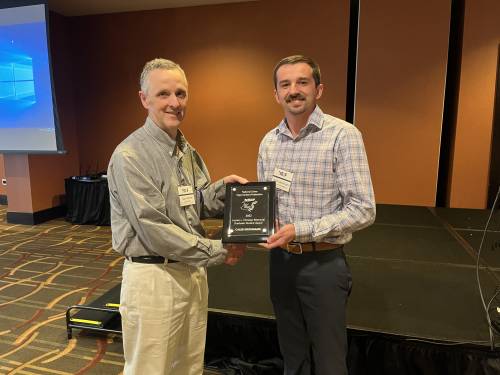
As labor and health challenges continue to mount in the swine farming industry, Caleb Grohmann, a Ph.D. student at MU’s interdisciplinary Institute of Data Science and Informatics, is hoping to provide some hope with the help of technology and industry partners. Grohmann’s work is already garnering national attention, as he was recently named co-winner of the Lauren Christian National Swine Improvement Federation Graduate Student Award by the National Swine Improvement Foundation (NSIF).
“In a single conversation with Caleb you will see that his serious demeanor conveys his intensity and passion for animal agriculture,” said Jared Decker, Wurdack Chair in Animal Genetics and Grohmann’s advisor. “This passion motivates him to be dedicated and put in the time necessary to be successful. In all sincerity and honesty, when my career is over decades from now, I am confident that Caleb will be one of the most successful students I have had the pleasure to help train.”
Grohmann’s previous research identified the genes that were changing due to selection decisions in a swine breeding program. This research highlighted important genes for swine production and how swine genetic lines are changing over time.
Grohmann’s current research uses data from hog barn sensors — some that are already commercially available and widely used and others that are newer to the market — to create machine learning predictions that will make these sensors even more robust tools for farmers. These predictions will provide new insights on when infections may be looming among the farmer’s livestock. He is working with industry partners, The Maschhoffs LLC, Boehringer Ingelheim, and Summit Smart Farms, to collect data from sensors that detect barn temperature, the pig’s water intake, and coughing incidents among the pigs at their operations and is analyzing that data in relation to mortality incidents — times when there are multiple hog deaths for multiple days. The goal to is create machine learning prediction that, when in use, can tell a farmer exactly when to call a veterinarian and provide early intervention to restore the health of their livestock.
Grohmann says his partnership with The Maschhoffs is key to completing this valuable research for swine producers across the country. Caleb’s PhD is funded by The Maschhoffs with matching funds from the USDA Foundation for Agriculture Research Rockey Fellowship program.
“I’m very grateful for their support,” he said. “They are sponsoring half of my graduate training, and that partnership brings many opportunities. It gives me access to a wide data set with operations across the Midwest.”
That wider data set will allow any tools Grohmann is able to create to be more reliable for the farmers who it will impact the most.
In addition to receiving an award from the NSIF, the federation invited Grohmann to speak at its recent conference. Grohmann has spoken at conferences throughout his undergraduate and graduate experience, which is now in its final year, but he said presenting at NSIF was different. It felt more impactful and meaningful because of the targeted audience.
“You don’t always get the opportunity to share your research with an audience where they can take things from it and fundamentally change the way they do things,” Grohmann said. “I was also able to take somethings back to the university that could be beneficial for my research going forward, and I really value that.”
Grohmann is currently focusing on publishing his research and plans to defend his dissertation in the summer of 2024.